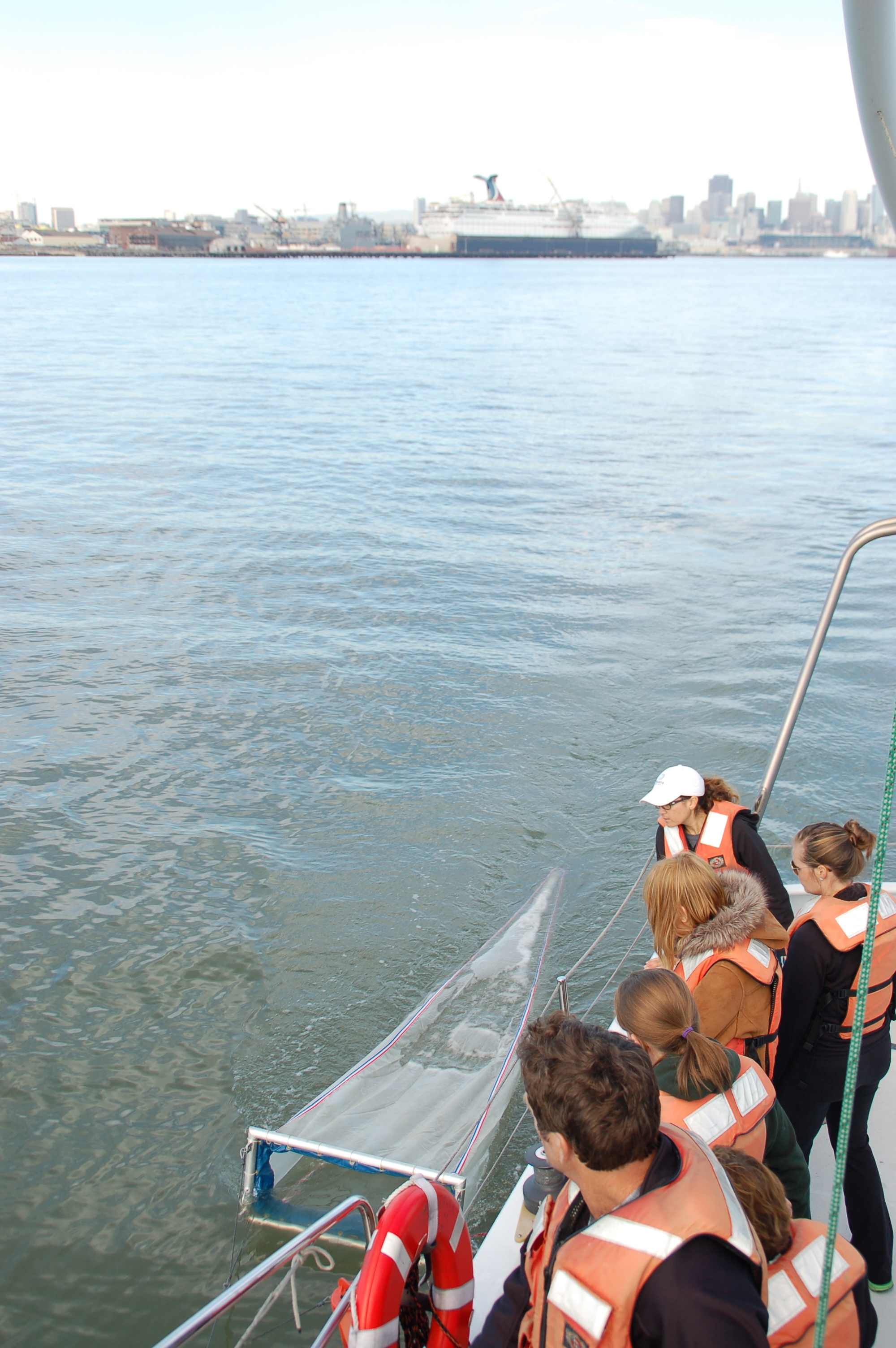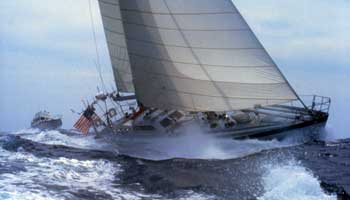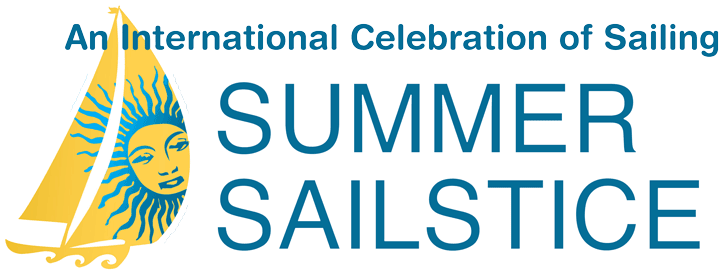
One of the great things about Summer Sailstice is connecting with sailors doing great things for both sailing and the world's oceans.
This past weekend we had the pleasure of getting on the water with one of those sailing ocean activists, Rachel Miller of the Rozalia Project. Rachel, and the inspiring people who collect around her Rozalia Project, give you faith that, though the state of the earth can often look dire, there are good people, working hard to readjust the earth's ecosystem towards a more sustainable path. Both Rachel and her co-founder and director husband James are avid sailors which is how they came to spend so much time on the ocean and, unfortunately, a lot of that time noticing marine debris. Thus motivated, they created the Rozalia Project to do what every parent has told their child - 'take out the trash!' And they're serious. They don't just study the trash in the oceans - they and their many interns are also removing it.

Rachel, in white hat, inspecting the tow with San Francisco in the background.
One other great thing is they do as much as possible from the deck of sailboats. This is for two reasons - they like to sail and sailboats are one of the environmentally benign ways to study the oceans. Sailboats are exceptionally low impact when powered by sails and only slightly more impactful under power. The day we went out on San Francisco Bay was aboard the 'Derek M. Baylis', the 60' Tom Wylie research vessel created specifically to be a sailing ocean research platform.
Our goal for the day was to introduce folks like me to the science of marine debris research while also collecting samples and debris from another patch of San Francisco Bay. Rachel and the Rozalia project have now done this in many metropolitan areas to see what's adrift in the waters off these densely populated, highly industrialized pieces of coastline. Their findings in most areas point to lots of small pieces of degrading plastics which are being vacuumed up by hungry aquatic life thus entering the food system or, if not ingested by the fish soon to be at your local fish counter, are drifting off and collecting in places like the great Pacific gyre.
While some of the waste comes from marine activity like the breaking down of styrofoam used as dock flotation the vast majority of it comes off the land. There are many things you expect to discover such as our 'catches of the day', an A & W plastic bottle, an escaped, mylar party balloon and a Jameson whisky bottle. However, we also learned that many products, such as 'all natural exfoliants' - skin washes that help keep your skin looking healthy, do their job while at the same time making the earth less healthy. Apparently exfoliants utilize small plastic beads as the scrubbing mechanism to clean your skin. They then go down the drain and into the Bay. Weird huh?! This is even true from companies like 'The Body Shop' which says this on their website, 'We believe true beauty comes from the heart. For us, beauty is much more than a pretty face. It's about feeling good and doing good, too.' Apparently they plan to phase out the plastic but can't do it until 2015? Really? The Body Shop has some good principles but this just feels a little lame.
The good news here is that one of your contributions to cleaning up the oceans might be pretty easy - just wash your face with something else. That seems simple enough.
On the East Coast the Rozalia project utilizes their own sailing mothership 'American Promise'. Here's the skinny on her from the Rozalia Project site, 'American Promise is Rozalia Project's trash-hunting mothership. She is a Ted Hood 60' built for Dodge Morgan (who was also very involved in her design) to make an attempt at the solo, nonstop circumnavigation record. He broke that record in 1986 and then donated it to the US Naval Academy who used it for sail training. In 2010, Rozalia Project acquired this amazing boat to fulfill our mission of finding and removing marine debris.' A good, solid boat for a good, solid mission!

Dodge Morgan sailed around the world, singlehanded, non-stop in 150 days aboard 'American Promise.'
Back on the Bay, as luck would have it there was no wind so we did have to power slowly up and down San Francisco's South Bay. But it was a clear and beautiful day which, as it turned out, is also what we found in the Bay. After doing our requisite 1/4 mile passes up and down the Bay trolling our marine debris net we discovered very little debris. This is good news and the result of the efforts of numerous individuals, companies and organizations. We did find exfoliant flakes and small bits of debris but, overall, it was a healthy looking day for the Bay. But it's hardly rained in 6 months so not much has been washed into the Bay and the streambeds are waiting to disgorge their stored 'treasures'. To cap it off a harbor porpoise spent 10-15 minutes swimming around us and popping up to say thanks. The harbor porpoises were absent from San Francisco Bay for about 60 years but returned several years ago as perhaps they've recognized a healthier Bay too. We know everyone has worked hard to make this possible and it's inspiring to be on the water, on a sailboat with people like Rachel and the Rozalia Project seeing the continued work and the promising results. That's a contribution all sailors and sailboats like 'American Promise' can make for all future generations.
The 11th Hour Project Executive Director, Joe Sciortino and Rachel Miller with the documentation of the morning's test patterns.
On a related note it was interesting to just read in a recently released book, 'Down By The Bay - San Francisco's History Between The Tides' how, back in 1868, Jeffries Wyman thought about sifting through civilization's trash. "Any one who would take the trouble on going to a strange city, to examine the rubbish in its suburbs and streets, and carefully collect and compare the fragments of pottery, pieces of cloth, of paper, of cordage, the bones of diferent animals used as food, worked pieces of stone, wood, bone, or metal, might gains some insight into the modes of life of the inhabittants, and form a fair conception of the progress they had made in the arts of civilization.'
In a sense that's what we were doing on the Bay. The wood is now carbon fiber, the cordage is now PBO, Spectra or some other exotic material but the concept is the same. Unfortunately, the rubbish you're sorting through sometimes isn't at a landfill but right in the Bay. Rozalia and 'American Promise' are promising to help make that better for future sailors and all ocean life.
